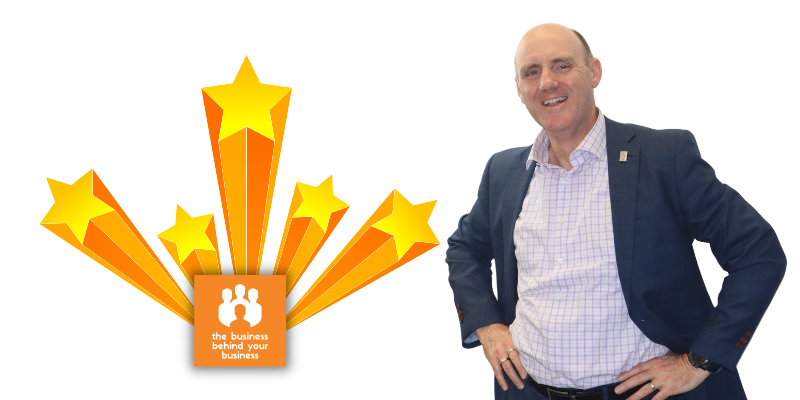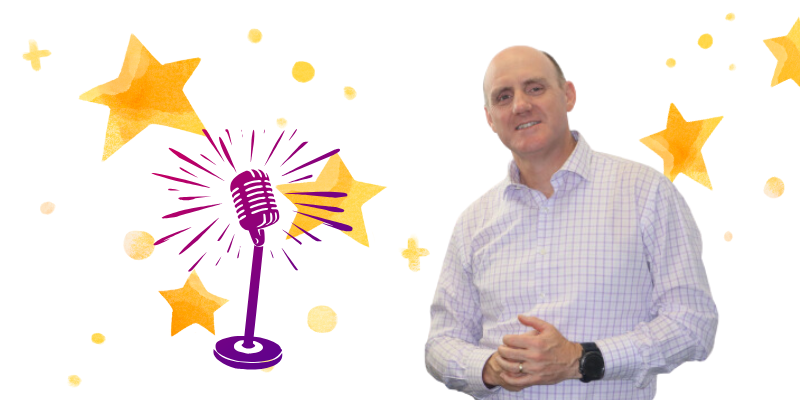Highlights from 2023
January 31, 2024

Podcast highlights from 2023
The Business Behind Your Business has had some incredible guests over the past year. I have been lucky enough to interview people from many different industries and share their stories and insights with our podcast audience.
Here are some of my favourite highlights from 2023:
Importance of relationships in business (Ep 124)
Jason Owen, from D2N Technology Solutions, shared some words of wisdom about getting back to the people-side of business. “Relationships in business are critical. And I think we’ve downplayed the need for those relationships, those connections, that communication, and we’ve gone too much into the online technology and we’ve stepped away and we’ve really lost something in our business transactions.”
Jason highlighted some strategies: “…a key one is listening with intent and, and not allowing yourself to let your preconceived ideas ignore the information you are hearing…And that’s a key important part there when you’re trying to build a relationship with someone, by listening to them with intent and listening to them without judgment. Not only will you help expand your own mindset, but you’ll understand exactly where they’re coming from.” Listen here
How storytelling can improve your business (Ep 123)
Nathan Williams, from Customer Return, talked about the benefits of storytelling in business. “Let’s define it first of all, because I think storytelling can be easy to dismiss. You know, we hear the word storytelling, we think, well, hang on a sec, we’re all grown up, in business these days. You know, we’re not a kid wanting a story from our parents, for example, or sharing stories in the school playground. So the word storytelling can be easy to dismiss, but, you know, credit where credit’s due. A gentleman by the name of Paul Smith, who wrote a book called ‘Sell with a Story’, defines storytelling as a universal master tool to connect with and influence people.
And I think that’s quite good. I mean, it’s quite a broad definition, but if we think about that in the, I’ll call it the client engagement or the business development context, it can certainly be used at the start. So before prospective client becomes a client, so in the introductory phase to build rapport, for example, to position your service appropriately, and then during the actual sales pitch and sales process, you know, for example, telling a client success story, or a story about someone who avoided a problem with your help.
And then, towards the tail end of that sales process as well, when you may be negotiating price or overcoming objections, and even after the sale as well, Paul, when it comes to after sale service and speaking about how clients have best utilised your service for maximum benefit. So that’s one reason why storytelling is important.
It’s universal. It does have applicability. People remember stories easier than data and facts and it can be used throughout the whole sales process and it cuts across, you know, genders, geographies, various demographics.” Listen here
Improving your cyber security by auditing and managing subscriptions
“The multiple things that we’re subscribing for, that potentially we don’t need, exposes us in so many ways because with all of those, they’ve got your email address, they’ve got your contact details, they’ve got a credit card to pay. So there’s multiple points of weakness, I guess, in your security plan.” (Paul Sweeney, Ep 122) Listen here
The crucial role of small businesses in our community (Ep 118)
The Honourable Bruce Billson, the Australian Small Business and Family Enterprise Ombudsman (ASBFEO) shared his thoughts on the importance of small business to the wider community: “Did you know small businesses are more likely to be sponsoring trainees and apprentices than big business? Do you know they’re more likely to be volunteers and community leaders in their own lives? Do you know the role they play in giving, you know, young people their first employment opportunity? Do you understand the vitality that they bring to your neighbourhood and your community? I mean, these are all parts of it, but it’s also important for us to keep reminding government and policy makers and frankly opinion leaders of these things. And we do that so that there’s no way of not knowing the importance and the nature of small business.” Listen here
Watch our podcasts on YouTube:
How your business will benefit from a ‘clean up’ mindset (Ep 122)
Many of us tend to stockpile things for a rainy day or for some unknown future because it could be useful down the track. This tendency applies to businesses, too. Are you guilty of this? Events in recent years have made it even more challenging to run a business. Covid lockdowns led to businesses having to frantically buy gear and create working-from-home setups on a grand scale. Many businesses have been left with a surplus of unused equipment. Subscriptions are another area where we can get caught. It’s so easy to sign up for the latest, greatest tool. Do you have software subscriptions that you don’t use? Are there duplications in your business tools? Developing a ‘clean up’ mindset helps you throw the doors open in your business and really take a closer look at your resources – what do you really need to run your business successfully? Are there services you need to replace or stop? Are there manual processes that you can automate? Take some time to assess your business. It can help you run a more efficient and profitable operation.
Dave Ferris, from DavelCorp Insurance Brokers, joined us for our live podcast recording and meet up and shared his thoughts on the ‘clean up’ mindset:
“I think there’s a real imperative to know in the business what services are you engaging externally, what contracts that you actually have and are engaging with others, and what are the implications of those contracts.
So the clean up mindset is about everybody’s looking at the moment to cost save. Expenses are increasing, the cost of everything’s increasing. So the whole idea is, as a small business, what do I need to take a stock take of? It’s not necessarily assets, but it’s also the services that you’re engaging other people to perform on your behalf.
So they could be accounting services, IT services, insurance broking services, but take a bit of a stock take and focus on what is the value that I’m actually deriving from that cost I’m incurring in my business. And you might say, some of these things I’m engaging, I can handle myself now, business has grown up a bit. Or, look, I’ve just engaged in this service provider, you know, when I was starting out and I’ve now evolved and maybe they’re not the best service provider for us any longer.
So it’s worthwhile with a clean up mindset to have a real good look at all those outgoings that you are paying out as a business to ensure one, you understand the value they’re deriving for you and your business.” Listen here
Are you ready to get control of your cash flow? (Ep 121)
Amy Bett, a Profit First Professional, talked about the benefits of having better control of your finances and cash flow. Amy shared her thoughts on the best ways for business owners and advisers to work together: “A lot of people also just think that because they’ve got an accountant and a bookkeeper that just means that everything’s going to be okay. But actually as the business owner, you are the one making the decisions in the day-to-day, spending the money, bringing the money in. So it’s actually your responsibility as the business owner to create a healthy business, with the support, obviously of your financial team, but your financial team can’t help you if you’re running blind.” Listen here
I hope you have enjoyed these excerpts from our interviews. Our guests have been so passionate about small business and had so many ideas to share, it was hard to highlight just a few. For more business strategies and advice, check out the full podcast episodes.
And if you have a question that you want answered on the podcast, you can add it here: https://www.speakpipe.com/TheBusinessBehindYourBusiness










